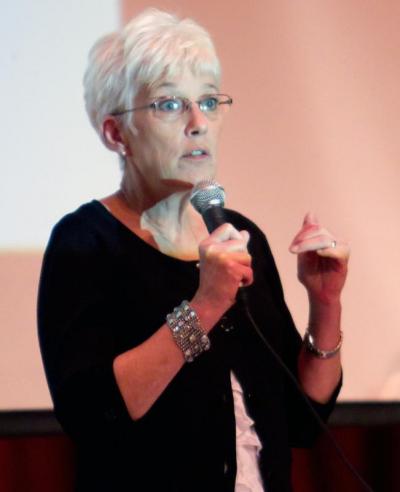Town Meeting concludes without vote on big-ticket purchases, allocates meals tax
Town Meeting concluded Tuesday with voters deciding not to weigh in on the remaining big-ticket purchases on the agenda.
Debate began Monday on an article that asked voters to approve purchases of various "capital" items - assets such as land, buildings, and equipment which are predicted to have a life of many years - with residents voting down a purchase of 40 defibrillators for the Police Department.
On tap for approval when the meeting reconvened Tuesday were a generator and a parking meter system for Wareham Police and funding for an ambulance rebuild for Emergency Medical Services.
But Town Meeting would not debate any of those purchases. Selectman Ellen Begley, citing financial uncertainty, instead proposed that residents indefinitely postpone votes on the remaining purchases.
"I heard this body last night and it became crystal clear to me when defibrillators were voted down that people were not against [public safety], but they were against what they viewed as fiscal irresponsibility," she said. "Let's bring this all back in the spring."
Begley's colleagues and members of the Finance Committee were in agreement.
"The town administrator last night told us that he had found a funding source [for the items] and that funding source was borrowed money, so to say that we have this money is incorrect," said Selectman Steve Holmes. "We don't know what the numbers are. Hopefully we're going to get ourselves on track to find out what those numbers are in the very near future and when we come back before the town in the spring, we're going to have a good solid plan with solid numbers."
Voters steadfastly argued Monday that the town should not make any purchases or borrow any money until more financial information becomes available.
Auditors are still ironing out a $919,000 variance between the town's general ledger and the treasurer's cashbook in fiscal year 2010, which was discovered by auditors last March. In an October 21 letter from accounting firm Powers & Sullivan addressed to Andrews, James Powers wrote that the discrepancy has been reduced by $180,000, but that auditors are still working.
The variance was caused by "errors in accounting activity" and auditors believe that the problem represents "an accounting variance as opposed to actual missing cash," Powers wrote.
Adding to the uncertainty, the fiscal year 2011 audit was delayed after "almost 500 journal entries were submitted by departments to the accounting office for posting to the [fiscal year 2011] ledgers," according to the letter.
Selectmen pointed out that a new accounting firm hired by the town to serve as the town accountant should be able to get the town back on track.
But not everyone was in agreement about postponing a vote on all the items.
Finance Committee member Donna Bronk argued that voters should give officials the opportunity to speak about the town's need for the rebuilt ambulance, which she called a "critical" public safety need.
"This town has two operating ambulances and two only. The [Emergency Medical Services department] turned over $300,000 to the town this year. They don't cost us money, they make us money," she said. "We're going to shoot ourselves in the foot."
The article was indefinitely postponed by a majority vote, however.
Before Town Meeting made its final decision on the capital items, School Committee member Geoff Swett attempted to add a lease of two school buses to the list.
"It is time we not only took this issue as a public safety [matter] and realized that the aging of our fleet does create problems, does create additional expenses," he argued.
A lease of seven school buses along with leases for a prisoner transport vehicle and a four-wheel drive vehicle for the police were included in the original proposal, but Town Administrator Mark Andrews said Monday that Treasurer/Collector John Foster recommended that the leases not be addressed at this meeting due to the town's "borrowing situation." Andrews said that the leases could not immediately be financed, but that he planned to add them to his fiscal year 2013 budget, to be approved by Town Meeting in April.
"No one should leave this room tonight with the illusion that between now and April we're going to find a lot of money," Swett said. "It is not going to happen. We're going to find out just how broke we are."
But Town Meeting attendees were not swayed.
The issue of planning for the purchase of big-ticket necessities was again addressed later in the meeting, though in the context of the increased meals tax approved by Town Meeting voters in April.
The Capital Planning Committee, which helps the town plan for such acquisitions, asked voters to allow the funding generated by the increased tax to be earmarked for capital needs.
The tax adds approximately 75 cents to a $100 restaurant tab and is projected to bring in roughly $400,000 in revenue per year.
Capital Planning Committee member Jim Giberti noted that in the spring, Town Meeting voters expressed the desire for the funding to be used for such a purpose.
But voters Tuesday were concerned with wording in the article that would have split the revenue 50/50 between the town and the School Department.
Selectman Michael Schenider said the proposal was "an end run around every town department [that] all have capital needs" and said he that since the School Department is a town department itself, voters should not give the schools "preferential treatment" over any other department.
School Committee member Geoff Swett argued that the money generated would not be enough to "tie the hands" of the town.
"This is just the proverbial drop in the bucket," Swett said. "It's just a small down-payment on the capital needs of the schools as well as a small down-payment on the capital needs of the town."
The proposal was ultimately amended to remove the 50/50 split, with the money only being earmarked for capital needs. It passed by a majority vote, but will still need to be approved by the state legislature.












